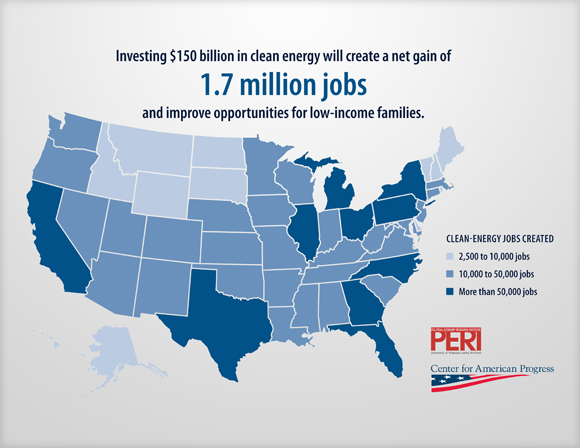This is the web version of the Select Committee's Clean Energy Update email.
Click here to return to the index of the Committee's Updates

The Select Committee on Energy Independence and Global Warming Clean Energy Update
Welcome to the Clean Energy Update, your resource for news, facts and useful points on energy, environment, and climate issues. Congress is moving to pass historic clean energy jobs legislation that will retool the American economy, help consumers and businesses, and end our dependence on foreign oil.
6.19.09 • Focus: New jobs reports and resources
Investing in Clean Energy = Jobs
A new report by the Center for American Progress and PERI/UMass indicates that the expansion in clean-energy investments (public and private) triggered by both the economic recovery act and the forthcoming Waxman-Markey American Clean Energy and Security Act will generate roughly $150 billion per year in new clean-energy investments in the United States over the next decade.
This would generate a net increase of about 1.7 million jobs. According to the report, these jobs gains would be enough, "to reduce the unemployment rate in today's economy by about one full percentage point."
Read more and downlaod the full report.
50 State Fact Sheets: Clean Energy Investment Creates Jobs in Every State
Interactive Map: A State-by-State Look at Clean Energy and Job Creation

New States Added to Clean Energy Jobs FINDER: IL, LA, MD, NC, NJ, NM
The Environmental Defense Fund has added six new states to their Less Carbon, More Jobs finder, a great tool to help you find clean energy companies in your Member's district.
The map finder now includes jobs info for: Arkansas, Colorado, Florida, Georgia, Illinois, Indiana, Louisiana, Maryland, Michigan, Missouri, New Hampshire, New Jersey, New Mexico, North Carolina, Ohio, Pennsylvania, South Carolina, Tennessee, Utah, Virginia.
News Stories & Opinion Pieces
ARKANSAS BUSINESS: Clean-Energy investment could boost arkansas economy, reports say
The new data show that a $1.3 billion investment in clean energy would create 18,000 new jobs in Arkansas; a $332 million investment in Little Rock would create 3,707 jobs; and a $304 million investment in Arkansas's 4th Congressional District would create 3,435 jobs. Moving to clean energy would also improve public transportation, especially in urban areas, which could lead to an average reduction in living costs by 1 to 4 percent per family
POST-BULLETIN [Column by Bill Boyne]: Saving the planet would help the world financially
Putting an end to global warming will also put money in the bank.
$900. That's how much the average U.S. household would save on their energy bills. The sum includes $580 saved on transportation costs, and $320 on electricity, natural gas and oil for heating if Congress enacts the smart policies that the UCS has recommended.
SILVER CITY SUN-NEWS [NM]: Commentary: Proposed energy bill makes sense for New Mexicans
The American Clean Energy and Security Act of 2009 or HR2454 is one of those rare pieces of legislation that not only has good intentions but also has a plan to generate revenue to support those intentions. For an outdoorsman and businessman like me, supporting this legislation makes sense.
CQ POLITICS: Senators: see alaska shrink on your summer break
“Everyone's been going to Greenland to see melting glaciers," said Democrat Mark Begich. “They should see the effects of global warming here in their own country."
NEW YORK TIMES: More studies extol virtues of green jobs
NEWS-SENTINEL [IN]: Indiana could get 38,000 'green' jobs from federal action
Federal spending from the stimulus bill and proposed environmental legislation could create 38,000 jobs in Indiana, according to reports issued Thursday by a group of environmental-advocacy organizations.
